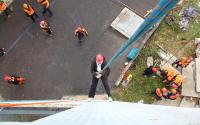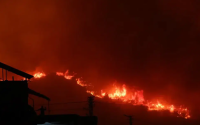25 August 2005Spiegel onlineGerman Papers
 |
DDP We're looking at a watery future, but what can be done to stem the tide? |
When the Germans start looking to the British for inspiration, you soon realise that desperation has set in. With an uninspired election campaign beginning to stagnate, and most of the world's political leaders on holiday, German news organizations, desperate for something to write about, have begun talking about the weather - that most English of concerns.While Portugal and parts of the Mediterranean suffer the effects of one of the fiercest heatwaves on record, Central and Eastern Europe have been hit by a deluge of rain, causing widespread flooding, many casualties and severe structural damage.The state of Bavaria, in southern Germany is one of the worst affected areas. Flood defences have been washed away after the Danube burst its banks, submerging last areas of flood plain, turning roads into rivers and inundating homes across the region. Hundreds of people have been evacuated by boat or helicopter.Schröder has pointedly stayed away for the time being, allowing his political rival and Governor of Bavaria Edmund Stoiber to inspect the damage. Schröder was no doubt wary of being lampooned for political opportunism; particularly after his criticism of US policy in Iran appeared to backfire.But the Chancellor is expected to don his boots today and inspect some of the worst affected areas, and one can guarantee the media will be in hot pursuit, to capture images of Schröder among the people.
Whilst there is a fair amount of comment today about the possibility of the floods becoming an election issue, a more interesting discussion about the underlying causes of all this extreme weather is also to be found within the broadsheets. Are we feeling the effects of the first ripples of global warming? And if so, what on earth can we do about it?
For Süddeutsche Zeitung these recurring extremes of weather are reaching biblical proportions, and confirm what scientists have been telling us for years. "Water and fire are finding a home in Europe like the plagues of Egypt," the commentator laments, and extremes of heat and precipitation are simply two sides of the same climate-change coin. "The trend is unambiguous. What used to be called 'the flood of the century' has become déjà-vu for people in many regions. You don't need to be a meteorologist or insurance salesman to recognise that fierce storms are raging ever more frequently." The problem is, the commentator writes, that it's all going to get worse before it gets better, regardless of what we do now. "Because damaging emissions remain in the atmosphere for a long time, (environmental) policies, even if operated on a global scale, would only have an effect decades later." Running parallel to the vital tackling of global greenhouse-gas emissions is the short-term, but essential, construction of protective barriers in regions threatened by repeated flooding. "This is time-consuming and costly, because ever since the 19th century right up till today, mankind has done everything to maximise the risk of flooding." By straightening the paths of canals and rivers and building extensively on the flood plain, we've made life difficult for ourselves, the commentator fears. The only solution is a network of dykes in high-risk areas, but these are notoriously expensive and only divert the problem somewhere else. When considering protective measures, three questions remain paramount, the paper believes: "How great could the damage be? How likely is the risk of flooding? And how high is the cost of risk-prevention?" The results of such calculations will affect the lives of millions. Protection of the environment is a cause-celèbre for left-leaning Die Tagezeitung and the paper takes the opportunity to drum home the importance of tackling global warming today. It too affirms the now cliché maxim that we have seen this all before: as parts of Europe are oppressed by heat, other regions are enveloped by flooding. And what scientists have been banging on about for a decade now makes perfect, and visible, sense. The paper helpfully condenses the science: "The emission of carbon dioxide warms the atmosphere, and as it gets warms, so it evaporates more water;" hence higher temperatures and more wet weather. And, this science is no longer debateable, the paper believes; dealing with the causes and consequences of climate change will affect us all. But we're not doing enough. "While scientists preach that the climate goals of Kyoto are only a start, the EU can't even manage the cuts in CO2 emissions agreed there... The floods show that environmental protection is no "luxury," the paper concludes. Berlin daily Der Tagespiegel devotes its front-page editorial to the environmental lessons to humanity must draw from this latest catastrophe. It too recognises that severe flooding is fast becoming an annual event, and suggests that we'd better get used to it. "Experts say that we will have such extreme weather more and more often. We can't change this; climate change has long since begun."But nor can we afford to resign ourselves to a future defined by volatile and destructive extremes of weather. "We can, and we must take countermeasures, so that it will not be as bad as it could be," the commentator insists. And simply building higher dykes and other flood barriers won't keep the tide of climate change at bay for long. There needs to be a fundamental change in attitudes. "We have to think further and we have to take climate protection seriously," the paper says. "This means fighting on an international lever for concrete CO2 reduction targets. This means promoting renewable energies and changing our lifestyles." Financial Times Deutschland, perhaps unsurprisingly, is less concerned about the environment than it is by politicians cynically exploiting the floods for electoral gain. "The suspicion is ... that the visits of (Bavarian Governor) Stoiber, (Bavarian Interior Minister) Beckstein, (Interior Minister) Schily and (Chancellor) Schröder are cheap manoeuvres to win votes out of the flood; just like in the electoral summer of 2002."The paper does point out that politicians are damned if they do and damned if they don't. After all, if politicians didn't express their concern and visit those worst affected, they would be resoundingly criticised for their inaction. The paper doesn't think there is any electoral benefit to be wrung out of the floods anyhow; the damage is not as widespread as in 2002. And finally, Sebastian von Bassewitz writing in the tabloid Bild effectively warns all of the colorful paper's readers not to be taken in by their politicians, especially Gerhard Schröder. "Natural disasters don't belong in the election," Bassewitz spells out -- nice and simply -- so everyone can understand.






